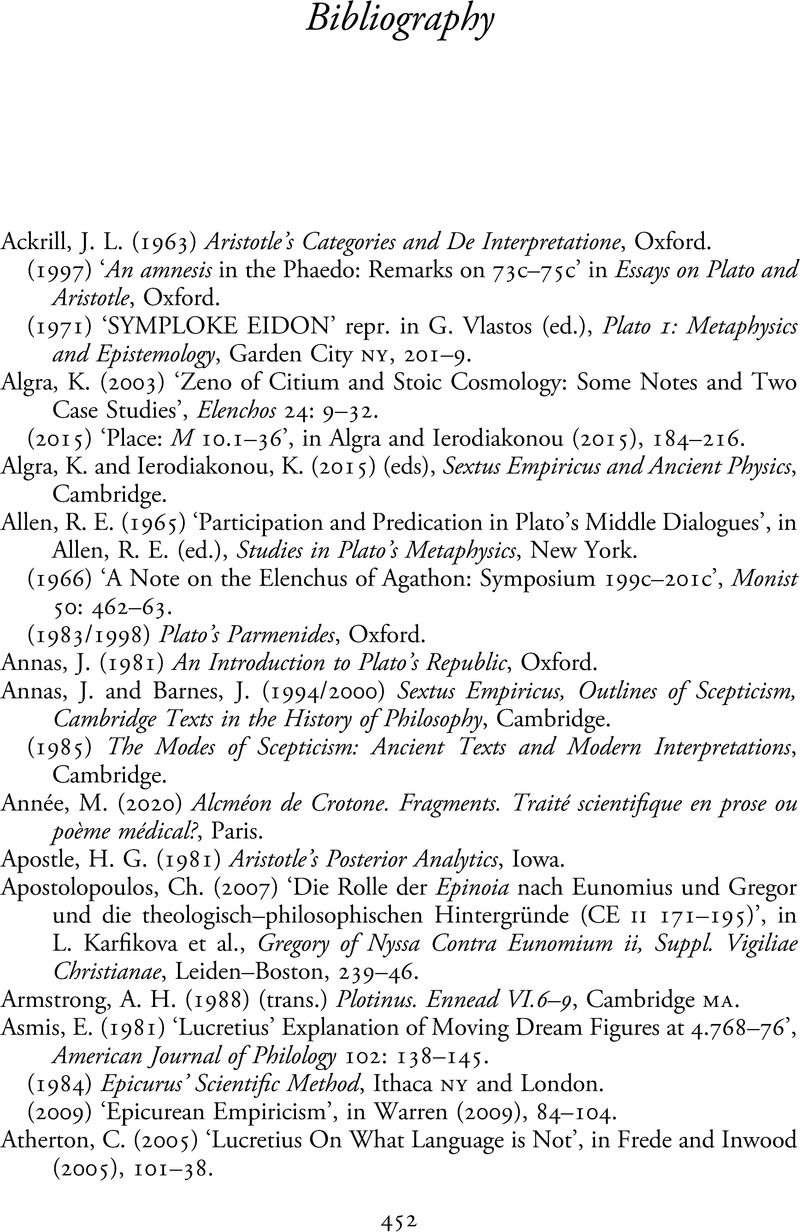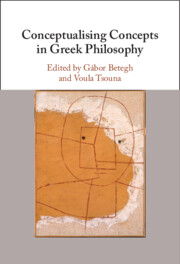Book contents
- Conceptualising Concepts in Greek Philosophy
- Conceptualising Concepts in Greek Philosophy
- Copyright page
- Contents
- Contributors
- Preface
- Abbreviations
- Introduction
- Chapter 1 The Emergence of the Concept in Early Greek Philosophy
- Chapter 2 The Place of Concepts in Socratic Inquiry
- Chapter 3 Early Learning in Plato, Republic 7
- Chapter 4 Are Platonic Forms Concepts?
- Chapter 5 Do Forms Play the Role of Concepts in Late Plato?
- Chapter 6 Concepts and Concept Formation in Aristotle’s Logical Works
- Chapter 7 Concepts and Universals in Aristotle’s Metaphysical Thought
- Chapter 8 Aristotle on the Stages of Cognitive Development
- Chapter 9 Epicureans on Preconceptions and Other Concepts
- Chapter 10 The Stoics on Conceptions and Concepts
- Chapter 11 Doing Things with Concepts in Sextus Empiricus
- Chapter 12 Relative Concepts
- Chapter 13 Concepts in Greek Mathematics
- Chapter 14 Platonist Notions and Forms
- Chapter 15 Contested Concepts
- Chapter 16 Alexander of Aphrodisias on Concepts
- Chapter 17 Plotinus on Concepts
- Chapter 18 Concepts in the Neoplatonist Tradition
- Chapter 19 Early Christian Philosophers on Concepts
- Bibliography
- Index
- References
Bibliography
Published online by Cambridge University Press: 25 April 2024
- Conceptualising Concepts in Greek Philosophy
- Conceptualising Concepts in Greek Philosophy
- Copyright page
- Contents
- Contributors
- Preface
- Abbreviations
- Introduction
- Chapter 1 The Emergence of the Concept in Early Greek Philosophy
- Chapter 2 The Place of Concepts in Socratic Inquiry
- Chapter 3 Early Learning in Plato, Republic 7
- Chapter 4 Are Platonic Forms Concepts?
- Chapter 5 Do Forms Play the Role of Concepts in Late Plato?
- Chapter 6 Concepts and Concept Formation in Aristotle’s Logical Works
- Chapter 7 Concepts and Universals in Aristotle’s Metaphysical Thought
- Chapter 8 Aristotle on the Stages of Cognitive Development
- Chapter 9 Epicureans on Preconceptions and Other Concepts
- Chapter 10 The Stoics on Conceptions and Concepts
- Chapter 11 Doing Things with Concepts in Sextus Empiricus
- Chapter 12 Relative Concepts
- Chapter 13 Concepts in Greek Mathematics
- Chapter 14 Platonist Notions and Forms
- Chapter 15 Contested Concepts
- Chapter 16 Alexander of Aphrodisias on Concepts
- Chapter 17 Plotinus on Concepts
- Chapter 18 Concepts in the Neoplatonist Tradition
- Chapter 19 Early Christian Philosophers on Concepts
- Bibliography
- Index
- References
Summary

- Type
- Chapter
- Information
- Conceptualising Concepts in Greek Philosophy , pp. 452 - 475Publisher: Cambridge University PressPrint publication year: 2024



